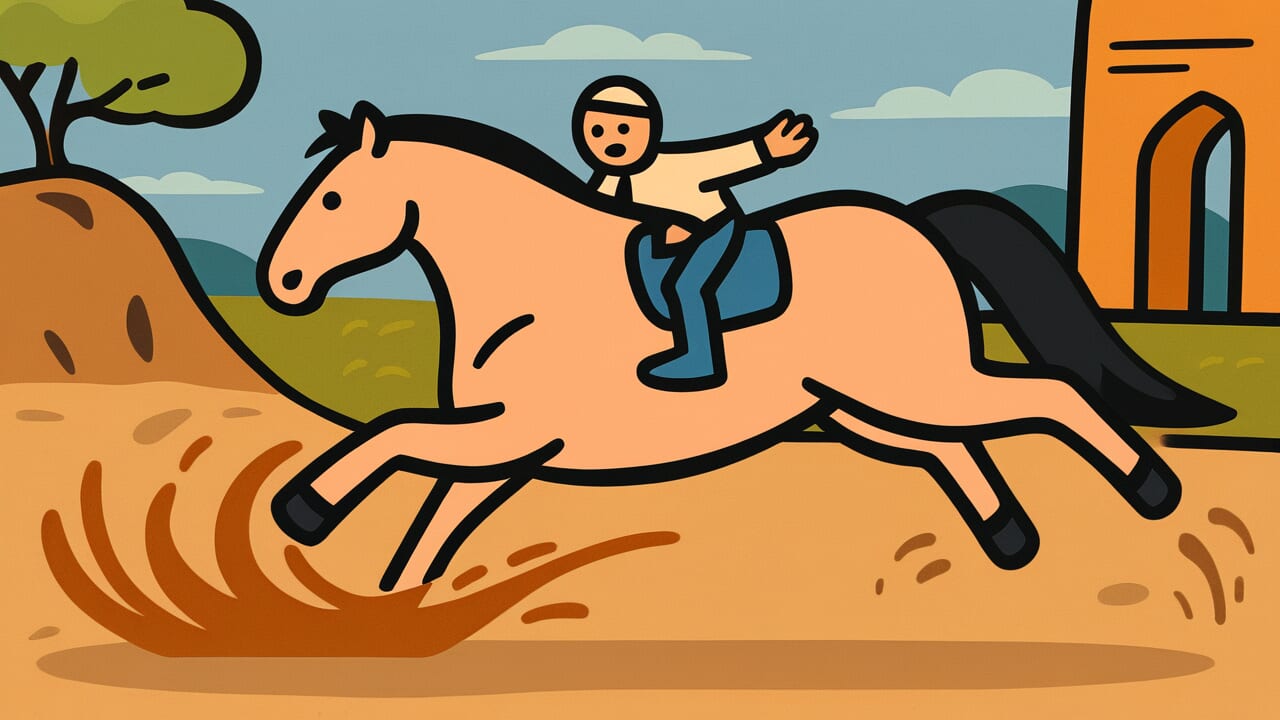How to Read “A spirited horse will jump even in death”
Haneru uma wa shinde mo haneru
Meaning of “A spirited horse will jump even in death”
“A spirited horse will jump even in death” is a proverb that expresses how deeply rooted traits and habits don’t change easily. It means that a person’s essential character and long-established habits are difficult to change, no matter how hard they try.
This proverb is used when pointing out someone’s unchanging nature. It can be used positively or negatively.
However, it’s often used when talking about troublesome habits or personality traits that won’t change. People say it with a sense of resignation or a wry smile.
Even today, everyone understands how hard it is to change long-standing habits and personality traits.
You decide to diet but end up overeating. You plan to wake up early but stay up late instead. Everyone has these experiences.
This proverb acknowledges how deep-rooted human nature is. It also teaches us the importance of accepting this reality.
Origin and Etymology
There are no clear written records about the origin of this proverb. However, we can make interesting observations from how the phrase is constructed.
Horses have been deeply connected to Japanese life since ancient times. They were essential for farming, transportation, and samurai warfare. Through this close relationship, people observed horses’ individual personalities carefully.
Horses have various temperaments. Some were high-spirited and jumped frequently. These horses had rough dispositions and restless energy.
The word “haneru” (jump) means more than just the physical action of leaping. It also implies being restless and having an intense temperament.
Such horses were difficult to train completely, no matter how much effort was put in. People watched these horses maintain their nature until their final moments, even when their strength was fading.
From this observation, people realized the same truth applied to human nature.
The extreme expression “even in death” emphasizes how deep-rooted traits and habits are. The proverb’s cleverness lies in using a familiar animal, the horse, to express unchanging essential qualities throughout life.
Usage Examples
- He loved flashy things when he was young, and even past sixty he’s driving a red sports car. A spirited horse will jump even in death, I guess.
- My father retired, but he still wakes up at 6 AM every morning to read the newspaper. They say a spirited horse will jump even in death, and it’s really true.
Universal Wisdom
“A spirited horse will jump even in death” touches on a fundamental truth about human existence. It speaks to the sometimes harsh but warm reality that our essential nature doesn’t change easily.
Why was this proverb created and passed down through generations? Because humans have always struggled between the desire to change and the reality that we cannot.
We make New Year’s resolutions but give up after three days. We decide to break bad habits but find ourselves back where we started. These experiences are universal across time and culture.
The deep wisdom of this proverb lies not in denying this fact but in teaching us to accept it.
Our essential nature remains consistent throughout life, and this consistency creates our individuality. Stubborn people stay stubborn until the end. Kind-hearted people remain kind-hearted forever.
These traits are both flaws and defining characteristics of who we are.
Our ancestors understood something important. Rather than forcing people to change, it’s more valuable to understand and accept their true nature.
No one is perfect. Everyone lives with certain habits and dispositions. Accepting each other is the wisdom of human relationships.
This is what the proverb quietly tells us.
When AI Hears This
A horse’s jumping motion isn’t just about muscles and bones. The spinal cord contains neural circuits called “central pattern generators.” These circuits automatically produce walking and running rhythms without commands from the brain.
In other words, when a horse jumps, it’s not thinking about it consciously. It’s an automatic program built into the spinal cord level.
What’s interesting is that these neural circuits are wired during the fetal stage according to genetic instructions. While they’re fine-tuned through life experience, the basic structure never changes.
For example, horse leg muscles contain many “fast-twitch fibers.” These are optimized for explosive jumping movements. The ratio of these muscle fibers is genetically determined.
Training can only change this ratio by about 10 percent.
Even more surprising, muscles contract when electrically stimulated after death. This happens because the chemical mechanisms in muscle fibers function independently of life processes.
So “jumping even in death” isn’t just a metaphor. It literally describes the structural characteristics of the neuromuscular system.
What this proverb shows us is profound. Essential nature isn’t a superficial habit that can be changed through learning or willpower. It’s a constraint written into the system’s blueprint itself.
Lessons for Today
This proverb teaches modern people the importance of tolerance toward ourselves and others. We constantly face pressure to change ourselves.
We think we must become better people and fix our bad habits. Are you constantly blaming yourself for not changing?
However, this proverb offers a different perspective. Your essential parts won’t change easily. This isn’t weakness—it’s the consistency of your existence.
Rather than pushing yourself toward perfection, it might be more constructive to understand your nature. Find ways to work with it instead of against it.
You can also extend this same tolerance to others. You might get frustrated with unchanging habits of family members or coworkers.
But that’s who they are. Instead of trying to change them, understanding and accepting them makes relationships much easier.
What matters is having the courage to accept what cannot be changed. You also need the wisdom to recognize what can be changed.
Cherish your core qualities while focusing on areas where you can grow. This kind of balance is what we need to live in the modern world.



Comments